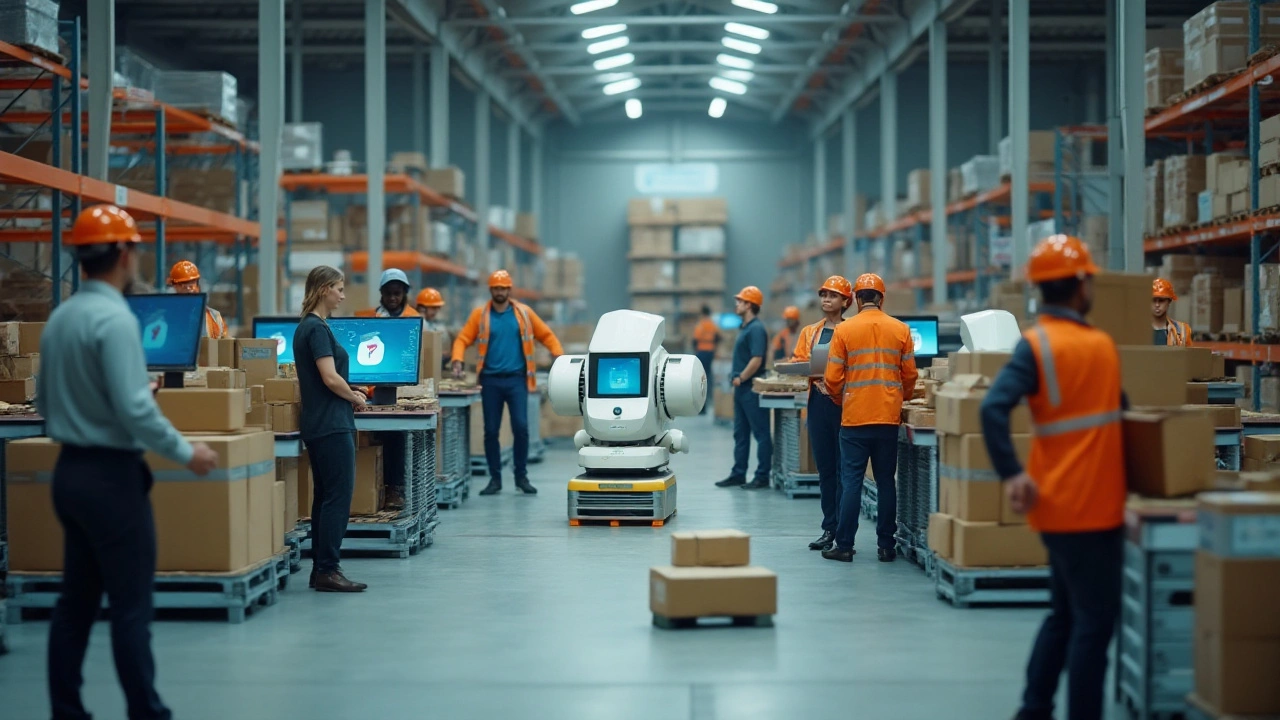Top Paying Jobs in E-Commerce Logistics: Uncovering the Lucrative Roles

In the ever-evolving world of e-commerce logistics, the demand for skilled professionals is on a steep incline. As businesses strive to deliver smarter and faster, certain roles within this sector have surged in terms of compensation. With consumers expecting seamless shopping experiences, the logistics backbone that supports these demands is garnering increased attention and financial investment.
Navigating through the myriad of job titles, those at the top of this well-paying pyramid often find themselves in roles that blend logistics expertise with cutting-edge technology and strategic business acumen. Understanding where these opportunities lie, and the qualifications required to land such positions, can empower aspiring logisticians and seasoned professionals alike to step into these rewarding roles.
- Introduction to E-Commerce Logistics Careers
- High-Paying Roles in Supply Chain Management
- The Intersection of Technology and Logistics
- Navigating Career Pathways in Logistics
- Future Trends in Logistics Industry
Introduction to E-Commerce Logistics Careers
The realm of e-commerce logistics has transformed fundamentally over the past decade, evolving rapidly from basic delivery systems to sophisticated, technology-driven networks that propel global commerce. This evolution is fueled by the exponential growth of online shopping and the relentless demand for swift, reliable delivery solutions. For those eyeing a career within this dynamic landscape, the opportunities are diverse and deeply rooted in a blend of traditional logistics foundations and cutting-edge digital innovations.
As e-commerce continues to surge, logistics teams are the unsung heroes ensuring that the entire supply chain—from manufacturer to doorstep—functions seamlessly. Careers in this field go beyond just coordinating the movement of goods; they involve intricate planning, real-time problem-solving, and leveraging technology to streamline operations. Transport management, warehousing, procurement, and supply chain strategy play pivotal roles in ensuring products move efficiently across borders and directly into consumers' hands. Professionals are often required to adopt a global outlook while maintaining localized efficiency, a balance crucial for success in supply chain management roles.
Moreover, the interplay between e-commerce and logistics careers also demands a keen understanding of consumer behavior patterns. Every action in logistics directly influences customer satisfaction, making adaptive strategies vital. This naturally shifts focus towards analytics, where data-driven decisions are paramount. Analysts and logistics planners are using sophisticated tools and technology to predict trends, reduce costs, and improve delivery times. This tech-focused approach is reshaping traditional roles, making IT skills almost as important as logistics expertise.
In support of this growth, educational institutions and professional bodies are developing specialized courses and certifications to build a pipeline of skilled workers equipped for these challenges. For current professionals in the sector, continuous learning and upskilling are essential. According to a recent study by McKinsey, the logistics sector is poised to experience unprecedented growth in the next decade, suggesting constant evolution and the creation of more specialized roles. As logistics becomes increasingly digitized, the integration with IT sectors opens further career pathways beyond traditional logistics environments.
To put the industry's significance into perspective,
"The global logistics market size was valued at USD 4,730 billion in 2021 and is expected to grow at a compound annual growth rate of 6.8% from 2022 to 2028," highlights a report by Grand View Research. This statistic underscores the burgeoning opportunity for those considering a career in this vibrant field. Emphasizing the need for innovation across the supply chain, industry leaders continue to invest heavily in technology enhancements to meet ambitious sustainability targets.These challenges and opportunities make e-commerce logistics not just a career, but a gateway into a world where technology, strategy, and consumer engagement converge.
High-Paying Roles in Supply Chain Management
In the intricate world of supply chain management, certain roles stand out not just for their complexity, but for their considerable financial rewards. At the heart of this industry are the supply chain managers, whose strategic decisions keep goods flowing efficiently from manufacturers to consumers. These professionals often draw the highest salaries in logistics, primarily because their expertise directly impacts a company’s bottom line. They are responsible for optimizing operations, negotiating with suppliers, and anticipating market demands, all vital for reducing costs and increasing service levels. The influence they wield makes top-tier supply chain managers indispensable, often resulting in salaries that can compete with those of high-level executives in other industries.
Beyond the traditional management pathways, roles like Chief Supply Chain Officers (CSCOs) have emerged, reflecting the growing recognition of logistics as a core strategic function. CSCOs often have a seat at the executive table, making decisions that affect the company at the highest levels. They not only oversee supply chain operations but also align these operations with the company’s overall strategic goals. The evolving technology landscape is also introducing new roles, such as Supply Chain Data Analysts and Logistics Engineers, which command substantial pay due to their specialized skills. These roles focus on leveraging data analytics and engineering principles to streamline processes and come up with innovative solutions to problems that have long persisted in the logistics sector.
Amy Davidow, a senior director at Deloitte, captures this sentiment well when she says,
"The integration of technology and supply chain is not just about efficiency; it’s about enabling a more responsive and intelligent operation. As a result, jobs that can master this balance are highly in demand and well rewarded."This highlights how strategic insight combined with technological adeptness is creating lucrative opportunities. Professionals who can navigate and lead these transformative changes are highly sought after.
The logistics sector is known for its adaptability, and those at the forefront of supply chain management must possess a range of skills. Apart from technical expertise, leadership and communication skills are critical, as these professionals need to collaborate across various departments and build relationships with stakeholders. As the industry continues to evolve with technological advancements, such as AI and blockchain, understanding these technologies will become even more essential. The industry demands professionals who can adapt quickly and propose solutions proactively, ensuring that operations run like a well-oiled machine.
In terms of compensation, a 2023 survey from the Logistics Management magazine showed that top-level supply chain executives earn an average salary well into six figures, reflecting the critical nature of their role. The demand for talented individuals in this field is intense, and businesses do not hesitate to invest in those who can make an impactful difference. As e-commerce becomes more complex and global, the skills required to manage these intricate systems are becoming more valuable, leading supply chain management roles to secure their place among the highest paid in logistics.

The Intersection of Technology and Logistics
The realm of logistics has transformed dramatically with the infusion of technology, creating a vibrant space where innovation leads the charge. As e-commerce continues to explode globally, logistics solutions have evolved far beyond simple warehouses and delivery trucks. Today, the integration of advanced technologies like Artificial Intelligence (AI), Internet of Things (IoT), and blockchain are not just nice-to-have tools; they're essential components of a cutting-edge logistics strategy. These technologies are reshaping everything from inventory management to last-mile delivery, offering unprecedented efficiency and transparency in the e-commerce logistics industry.
AI algorithms are driving smart automation across logistics operations, reducing human error and freeing up resources for more strategic tasks. For instance, AI is used in predictive analytics to anticipate demand, helping businesses stock just the right amount of products, thus minimizing wastage and maximizing space usage. At the same time, IoT devices play a crucial role in enhancing the visibility of the supply chain—companies can track shipments in real time, monitor storage environments, and respond proactively to changes. This connectivity means problems can be anticipated and solved before they impact the customer, a crucial edge in the competitive e-commerce landscape.
One of the most fascinating advancements is the use of blockchain for ensuring transparent and immutable record-keeping. As transactions become more complex and globalized, having a secure and trustworthy system is invaluable. Retail giants and small businesses alike are beginning to adopt blockchain to verify the authenticity and origin of goods. According to a report from the World Economic Forum, by 2025, 10% of global GDP will be stored on blockchain technology, underscoring its potential significance in logistics. Emerging technology is rewriting the rules of logistics, and those who adapt quickly are seeing the benefits both financially and operationally.
Yet, for all the potential gains, technology integration presents its own set of challenges. Companies face hurdles such as high implementation costs, cybersecurity risks, and the need for a workforce adept in these new tech tools. This means the highest-paid roles often require a blend of logistics understanding and technological savvy, with leadership qualities that can bridge the two. As quoted by a Warehouse News editor:
"Embracing technology not only improves logistical efficiency but also builds resilience against market disruptions—a comprehensive approach is the key to sustainable success."Indeed, hiring managers are shining a spotlight on professionals who can navigate this digital shift, making technology-driven roles some of the most promising in the logistics field.
The role of drones, autonomous vehicles, and robotics cannot be overlooked in this discussion. These technologies are literally driving logistics into the future. While drones promise to conquer the challenges of rural and hard-to-reach shipments, autonomous vehicles are set to revolutionize the urban delivery landscape, reducing both human labor costs and carbon footprints. Meanwhile, robotics within warehouses is optimally handling the heavy lifting, from sifting through inventory to packaging, thereby accelerating processing times and ensuring accuracy. Businesses that leverage these technologies might see a reshaping of their profit margins, as these efficient systems slash unnecessary costs.
Navigating Career Pathways in Logistics
Choosing a career in logistics opens up a world teeming with opportunities, especially in the burgeoning field of e-commerce. The path from entry-level roles to high-paying positions is not just about gaining experience, but also about acquiring specific skills that align with industry needs. Understanding the nuances of the logistics landscape is key to navigating your career successfully. Those aspiring to top-tier roles should focus on formal education in supply chain management or logistics, as well as certifications that bolster their expertise. For instance, certifications like Certified Supply Chain Professional (CSCP) and Certified in Production and Inventory Management (CPIM) can significantly enhance one's credentials, providing a competitive edge in the job market.
On-the-job experience is invaluable in logistics, and internships or entry-level positions offer the perfect avenue to learn the ropes. These roles, even if they don't pay much at the start, are critical for understanding the finer points of logistics operations. With time, professionals can transition into roles such as operations manager or logistics analyst, where strategic thinking and decision-making become critical parts of daily tasks. Developing expertise in specific areas, such as inventory management or warehousing, can also help professionals advance. As you gain experience, seeking mentorship from seasoned logisticians can provide insights and open doors to opportunities in more challenging roles.
Networking is another crucial element in advancing logistics careers. Attending industry conferences and workshops can expose you to the latest trends and technologies, and provide opportunities to connect with peers and leaders in the field. Building a strong professional network can offer support and guidance, especially when navigating complex career decisions. Participating in online logistics forums and groups also expands your knowledge and keeps you informed about industry shifts. It is in these settings that you might come across surprising opportunities or partnerships that can elevate your career.
"Logistics is an indispensable element of global trade. Staying ahead in this field requires not only keeping pace with technology but also predicting the needs of the business," says John Manners-Bell, a renowned expert in the field. This insight underscores the importance of continuous learning and adaptation in logistics careers, especially as e-commerce constantly stretches the boundaries of traditional logistics frameworks.
As you carve your path in logistics, consider pursuing roles that bridge logistics with technology. The convergence of tech and logistics is creating roles like logistics software developers and technology project managers, which are highly sought after. These positions require a blend of logistics knowledge and technical proficiency, making them perfect for those who are tech-savvy. Ultimately, the logistics sector offers myriad pathways that can lead to rewarding careers if navigated strategically. By focusing on skill development, networking, and staying informed about industry trends, you're more likely to advance into those coveted roles that not only pay well but also push the envelope in shaping the future of e-commerce logistics.

Future Trends in Logistics Industry
The logistics industry, an essential component of the global supply chain, is experiencing rapid transformation driven by evolving consumer expectations and technological advancements. With e-commerce growing by leaps and bounds, logistics must continuously adapt to keep pace. One of the key trends reshaping this sector is the integration of artificial intelligence. AI is leveraged for demand forecasting, route optimization, and inventory management, greatly enhancing efficiency. Imagine AI-driven systems alerting warehouses about restocking needs in real-time or predicting the most efficient delivery routes based on weather and traffic conditions. These innovations not only reduce costs but also improve service times, which is crucial in a world demanding faster deliveries.
Another major trend impacting logistics is the rise of sustainable practices. Businesses worldwide are under increasing pressure to reduce their carbon footprints, not just from regulators but also from an environmentally-conscious customer base. Companies are investing in electric and hybrid delivery fleets, optimizing logistic networks to minimize emissions, and using eco-friendly packaging. These changes are not just ethical choices; they are becoming business imperatives as environmental stewardship becomes a critical component of brand identity. Engaging consumers who prioritize sustainability can drive loyalty and potentially capture new markets.
Meanwhile, the role of blockchain technology is gaining traction in providing transparency and security in the supply chain. This distributed ledger technology helps in tracking products through every stage of the supply chain, providing immutable records that deter fraud and streamline processes. For example, luxury goods and perishable items can be tracked from the point of origin to the consumer, ensuring authenticity and timely delivery. According to a survey conducted by Deloitte, over 50% of executives in the logistic sector are considering blockchain as a strategic priority over the next five years to improve transparency and efficiency.
"Blockchain's real game-changing potential lies not in single companies, but in reimagining the borderless, consumer-driven, and value-added services that offer the agility needed in today’s fast-paced trade environment," states Deloitte's report.
The shift towards omnichannel logistics is another significant trend. Consumers today expect consistent and seamless interactions across all shopping channels, whether online, in-store, or hybrid formats like click-and-collect. As a result, there is a growing need to integrate brick-and-mortar and online operations. Logistics providers are enhancing their capabilities to support such multi-channel operations, which includes sophisticated inventory management systems that ensure products are available where and when customers want them. Companies are increasingly adopting integrated ERP systems to manage these complex needs seamlessly.
Embracing Technology for Better Connectivity
The future of logistics also hinges on connectivity and IoT applications, which enable real-time visibility over the entire supply chain. From smart sensors on cargo ships to robots in fulfillment centers, the Internet of Things is playing a pivotal role in reshaping logistics operations. These IoT devices provide detailed, timely data on everything from package location to the internal conditions of a cargo hold, enabling better decision-making and problem-solving. As 5G networks expand, their increased speed and reliability will further enhance these capabilities, ushering in an era of unprecedented connectivity and real-time logistics.
As logistics professionals look to the future, understanding these trends is essential not only to remain competitive but also to harness new opportunities for growth and innovation. The ability to adapt to these changes and effectively incorporate new technologies into traditional transactional models will likely distinguish the industry's leaders from the laggards. For those in the field, this is not only a time of challenge but also a promising era rich with potential.